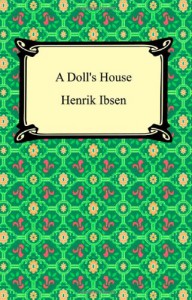The liberation of divorce

I am a little unsure about this play the more that I think about it. This was one of those plays that I read in year 12 English that my English teacher loved and that I hated, but the reasons that I hated it back then have changed a lot now and I suspect that if I were to see it in a book shop (along with some of Isben's other plays) I would be tempted to purchase it. The reason being is that Bernard Shaw seems to write a bit about Ibsen and as I look at some of the images of this book which shows an open bird cage, it makes me think that this book is a lot deeper than I expected.
The play is effectively in two parts and deals with a husband and a wife. The first part of the play the wife is a loyal subservient wife to her husband and from what I can remember the husband is not a particularly bad person (though I cannot remember his character all that well). In the second part the relationship suddenly changes (something that put me off the play) and the wife is suddenly talking about leaving her husband. The play finishes with her walking out of the door.
Leaving behind the dramatic change in the wife's character, the reason that I hated the play was simply because of the Christian propaganda that was being piled onto me at the time. Okay, granted, God hates divorce because the idea of marriage is supposed to be permanent in that it is a representation of our relationship with God. God is ever faithful and expects the same faithfulness in return. However, we cannot forget that this is a reflection of a perfect world and we cannot expect people to be loyally faithful to somebody who does not show the same faithfulness in return. Divorce is what I call a necessary evil.
Now, Christians are up in arms over the changes to the divorce law (at least in Australia) in 1975 when they made divorce a no fault system. This was because prior to this change there had to be a reason for a divorce. The idea for the change was not so much as to make divorce easier (it was still pretty easy back then) but rather to take the whole mudslinging that fault based divorce systems (which still exist in the United States) out of the court room. Okay, it does not actually do that because there is still a lot of mud slung during broken marriages, and I guess it does make divorce easier, but then again it is another example of a minority attempting to impose their morality onto a world that does not want it.
The cage, I suspect, represents marriage as a prison. I have suggested previously that marriage is a form of chattel slavery, particularly in the 19th century, in that the wife was simply seen as the possession of the husband. Unfortunately that still continues today. For instance, when a pastor preaches on the passage in Ephesians regarding marriage, many of them seem to talk about the husband loving their wives (though not always drumming the point of 'as Christ loved the church and gave up his life') and then spending more time on wives obeying their husbands (as well as proving that the Greek says exactly the same thing). Even if they do give each equal weighting, many of the husbands will simply glaze over the 'love your wife' part of the sermon and focus on the 'obey your husband' part, and then proceed to remind their wife of such when they get home.
The interesting thing that I have noticed is the whole hypocrisy of this. One example was an old friend who got married and discovered that her husband was a violent pig, so divorced him. She was immediately excommunicated because she had broken the bonds of marriage (despite the fact that the marriage had already been broken when he became violent) and the husband kept as a privileged member, moreso after his wife walked out of him. The second was a couple in the church that held positions akin to that of an elder. They were the perfect couple with the perfect wedding. Everybody wanted to be like them, but then they went overseas to live, and after a number of years we hear that they have become divorced. I simply do not know the facts behind the divorce, and I am loathe to speculate, but they are two examples of how this whole idealistic marriage idea has broken down. Further, the other thing that goes out of the window when there is a marriage breakdown is truth (much like war). I hear of an elder in the church getting divorced because his wife walked out on him, and he tells me the story of what happened, and I feel sorry for him. Then I wake up and realise that I have never heard her side of the story.
However, at this stage, I am now hesitant to trash this play on the grounds of my previous, narrow minded, Christian outlook on the world. Further, since it has been a very long time since I read this play, it may be an idea that if I do see it, to pick it up again and reread it.


